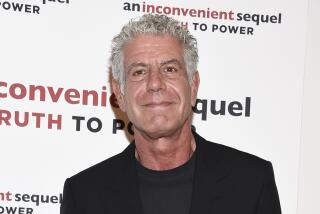Husband Feared Her Moods, Psychologist Says : Marriage Counselor Calls Troiani a Tormentor
- Share via
A clinical psychologist who saw Laura and Carlo Troiani for marriage and family counseling in the weeks before Troiani was slain characterized Laura Troiani on Wednesday as a manipulator and a “hard person” who “tormented” her husband and was not at all depressed at the time of the killing.
Carlsbad marriage and family counselor James Bondell, who saw the couple 20 times from April through July, 1984, said Laura Troiani teased her husband by withholding sex from him, was the dominant force in their relationship and was otherwise “ambivalent” about marital problems the couple was experiencing.
“Was there anything you saw in the course of treating Laura Troiani for 3 1/2 months to indicate she was suffering from a major depressive episode?” prosecutor Paul Pfingst asked.
“No,” Bondell replied.
“Was it possible it slipped by you?” Pfingst asked.
“No, not at all,” Bondell answered, saying that major depression is so obvious that even untrained observers can detect it.
Hope to Blunt Testimony
Prosecutors hope Bondell’s testimony will blunt that of psychiatrist Dr. Mark Mills, who has examined Laura Troiani for 15 hours since November and has testified for the defense that she was too depressed and melancholic to have planned and carried out the ambush murder of her husband on Aug. 10, 1984.
The defense maintains that Laura Troiani was emotionally and physically abused by her husband and that she was helpless when she realized her fantasy of wanting her husband dead became a reality at the hands of five Marines who indulged themselves in violence and anti-social behavior.
The district attorney’s office won the right to call Bondell to the stand and discuss his counseling of the Troianis because the defense had already waived patient-doctor privilege by calling Mills. Prosecutors believe that Bondell’s analysis of Laura Troiani’s mental and emotional state might be weighed more heavily by the jury than Mills’ since Bondell examined her just days before Carlo Troiani’s killing, compared to Mills’ more recent examinations.
Bondell said he met privately with Laura Troiani eight times, alone with Carlo Troiani five times, and met with them together as a couple seven times, for 45 minutes per session.
He said he concluded that Laura Troiani was not depressed but, rather, was suffering from a “weak” case of anxiety common in troubled and stress-filled marriages.
To deal with that anxiety, Bondell said, “she manipulated the world to try to get what she wanted.”
He denied observing any of the symptoms of major depression that Mills testified he observed in Laura Troiani more recently and which he concluded also existed in August, 1984, including sudden weight change, feelings of worthlessness, suicidal wishes, indifference to pleasurable stimuli and fatigue. Bondell did acknowledge that Troiani complained of bouts of insomnia, another symptom of depression.
Physical Abuse Not Mentioned
Under cross-examination by defense attorney Geraldine Russell, who has tried to elicit testimony that Carlo Troiani had physically beaten his wife, Bondell said Laura Troiani never complained of physical abuse but said that Carlo Troiani’s yelling was a problem.
To help solve the shouting problem, Bondell said, he suggested that Carlo Troiani put $1 in a kitty to be earmarked for family entertainment every time he yelled. By the end of a week, he said, $15 had accumulated.
Bondell, under questioning from Russell, conceded that he did not specifically set out to evaluate whether Laura Troiani was suffering from major depression and thus did not specifically put questions to her that would have shown more clearly whether she was suffering from depression.
“I didn’t need to,” he said, saying that in the course of the general counseling she showed virtually none of the symptoms of depression to give him cause for suspicion. Unlike the defense’s contention that Laura Troiani was melancholic, Bondell found her to be a “socially active” woman who complained to him that “Carlo wanted her to stay home and be with him.”
“Laura controlled the family,” Bondell said. “Carlo was in fear of her moods. He walked on eggshells most of the time, not wanting to upset her (because) she would become very mean to him. He had a wonderful day if he got a kiss or she put her arm around him.”
Asked whether Laura Troiani was a “fragile” woman who needed her husband’s approval for her self-worth, Bondell said, “No. She didn’t need it because she was pretty much in control of the relationship.”
Countering a defense contention that Laura Troiani was overwhelmed by the five co-defendants’ desire to kill her husband, Pfingst asked Bondell: “Did she have a reduced ability to resist the pressures of others?”
“No,” Bondell responded.
Dynamics of Men
The defense’s main witness Wednesday was Lionel Tiger, an author and a professor at Rutgers University specializing in group behavior and, more specifically, the dynamics of men in group situations.
Testifying outside the presence of the jury because of a prosecution contention that his observations are irrelevant, Tiger maintained that Laura Troiani could not have the ability to manipulate five Marines to kill her husband.
Rather, he suggested, Troiani’s killing was a crime of passion--the passion of five men for violence, in which Laura Troiani was little more than an observer.
“She had the perception that she was merely an incident in what these men were doing, and if she wasn’t (available to them), they’d find another cause” for violence, Tiger said.
Arguing that “organized violence is virtually a male monopoly,” he dismissed the notion that Laura Troiani was a “black widow” who seduced the Marines into killing her husband.
The “black widow” theory is “a fascinating idea in legend . . . a misplaced overestimation of the power of women, a folk image which doesn’t explain very much,” he said.
Laura Troiani could not be considered the mover and the shaker in the plot because she did not attend some of the most important planning sessions for Carlo Troiani’s killing and because her inducement of a $500 payoff to each killer was “ludicrous,” an offer too small to have been taken seriously, Tiger said.
He said the five co-defendants were too bonded to one another--even to the extent of one of them naming another as the beneficiary of his life insurance policy--for Laura Troiani to wield much influence over them.
Pfingst argued before Superior Court Judge Gilbert Nares that Tiger should be prevented from testifying before the jury because the issue of whether she was the leader of the pack or the follower is of no legal consequence.
“If she aided and abetted in any way, she’s guilty,” he said. “To establish a pecking order (of influence) in the group is not relevant.”
To allow Tiger to testify as to group dynamics and discuss the relative influence a woman would have over five men “is asking someone else to be the jury . . . and invades the province of the jury,” Pfingst said.
Russell argued that Tiger’s testimony is important because it addresses the issue raised by the prosecution that Laura Troiani was the “ringleader and paymaster” of the group.
Nares said he would rule on the admissibility of Tiger’s testimony today, when the trial resumes in Vista.
On Monday, the prosecution will continue its cross-examination of Mills and bring to the witness stand its own psychiatrist, who examined Troiani last week.
More to Read
Sign up for Essential California
The most important California stories and recommendations in your inbox every morning.
You may occasionally receive promotional content from the Los Angeles Times.













